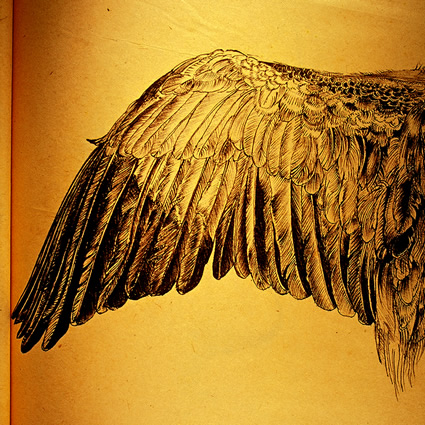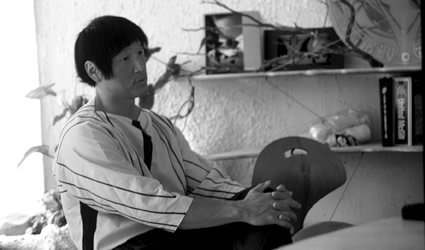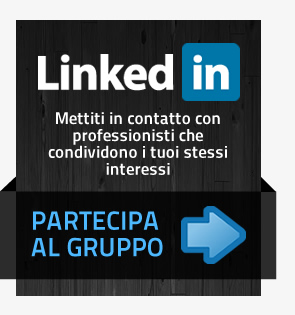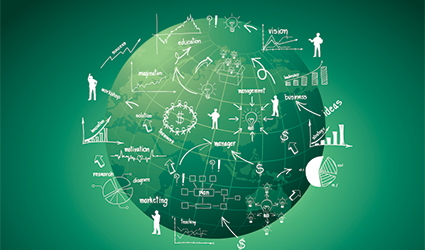Se qui sei nuovo ISCRIVITI alle News RSS feed. Thanks for visiting!
Un’ineguagliabile ed interessante intervista con il Dr. Eugene Tsui su come le persone con le loro scelte e le loro vite e abitudini quotidiane possono influenzare l’evoluzione dell’umanità. Il Dr. Eugene Tsui ha un punto di vista radicale su come dobbiamo agire ADESSO, cosi come tutti noi che siamo preoccupati per le nostre vite e quelle delle future generazioni; non possiamo però (anche se a volte vorremo) entrare in uno stato di paralisi o scappare dalle nostre vite e società attuale per andare lontano in un posto dove poter ricominciare da zero o liberarci dal “sistema” ed essere autonomi per le nostre necessità più fondamentali. Dobbiamo agire all’interno di questa ragnatela nella quale siamo cresciuti per cambiarla proprio da dentro.
Esploriamo quindi questa visione su come questo cambiamento potrebbe essere realizzato attraverso gli occhi del Dr. Tsui, che già abbiamo incontrato nelle nostre interessanti e curiose interviste, continuando a donarci le sue preziose intuizioni che sicuramente varrà la pena conoscere.
An interview with Dr. Eugene Tsui on how people with their choices in their everyday lives can influence the path of humanity. Dr. Eugene Tsui has a radical point of view on how we should ACT NOW which most of us concerned about our lives and those of future generations coincide; we cannot, though we might like to, sometimes; enter into a paralysis and leave our current lives and societies and just move somewhere else where we can start from scratch, free ourselves from the ‘system’ and be self sufficient in our most basic needs.
We need to act inside this matrix we have evolved into and change it inside out. Let’s explore how this might be done through the eyes of Dr. Tsui, whom we have seen from our past interview has very precious insights that are certainly worthwhile exploring:
- Araceli de la Parra: Un rifugio dove vivere, questa sicuramente è una delle questioni più difficili da affrontare insieme, vista la tua visione sull’architettura contemporanea. Ma se tutti dovessimo abitare nel tipo di case che tu ci descrivi e realizzi, dovremmo quindi fare tabula rasa ed iniziare da zero? Come pensi che gli edifici esistenti possano evolversi per accogliere uno stile di vita più sostenibile? Un migliore isolamento termico tramite pareti verdi (giardini verticali ad esempio), sistemi di recupero di acque piovane o macchine ecologiche (fitodepurazione), come ti sembrano queste soluzioni applicate a palazzi esistenti? Quali alternative ha l’individuo per accelerare questa evoluzione?
Dr. Eugene Tsui: Modificare edifici esistenti per migliorarne l’efficienza biomimetica dell’habitat naturale circostante con un rapporto simile tra forza e peso e caratteristiche aerodinamiche ben determinate è un’impresa inutile. Le nostre strutture a cubo sono talmente deboli strutturalmente e non aerodinamici che non dovrebbero nemmeno esistere. Il primo vento forte, terremoto o forza schiacciante delle onde che premono sulle nostre strutture a scatola, le distruggerebbero sicuramente.
Come è possibile cercare di rinforzare o modificare queste trappole di morte? Quanti milioni di vite devono essere perse prima di vedere l’urgenza di cambiare la nostra architettura? Quante centinaia di migliaia di case, posti di lavoro ed edifici municipali devono collassare prima che possiamo trovare un altro modo di realizzarle? Questo processo è andato avanti per secoli senza modifiche visibili in vista. Questo è lo stato della nostra ignoranza collettiva.
Dobbiamo ripartire da 0, dall’origine, dai principi base e formidabili della natura per creare strutture che dissipino e disperdano le forze pericolose, creando forme che sono simultaneamente efficienti energeticamente, aerodinamiche, flessibili e che accolgano bene i movimenti degli organismi che gli abitano. Le nostre strutture a cubo non fanno nessuna di queste cose ed è per questo che sono cosi letali ed inefficaci. Possiamo aggiungere “meccanismi” come giardini verticali, sistemi di raccolta della acque, ecosistemi, fitodepurazione, pannelli solari, flowforms, etc, ma questi sono esterni e soltanto optional aggiunti piuttosto che far parte integrale dell’origine della struttura.
Dobbiamo trovare e creare delle forme e strutture che inerentemente accolgano tutte queste caratteristiche quasi come un organismo vivente che è stato progettato con queste caratteristiche come una funzione intrinseca della sua psiche. I nostri corpi umani sono progettati per fotosintetizzare i raggi del sole, digerire il cibo e ottenere minerali e nutrienti preziosi, i nostri corpi sono fatti per vedere, per sentire, per gustare e toccare per rispondere adeguatamente al nostro “intorno”. Possediamo meccanismi per rinfrescarci nel caldo e per riscaldarci nel freddo, in altre parole, siamo stati progettati per essere autonomi e indipendenti, per portare ed utilizzare completamente tutta “l’apparecchiatura” necessaria e adattarsi agli ambienti e circostanze che cambiano.
In contrasto, I nostri habitat “quadrati” sono poco capaci di adattarsi e poco autonomi; il risultato può diventare anche un’inefficace se non grottesco tentativo di modificare la scatola. Sì, dobbiamo ricominciare da capo. Dobbiamo distruggere completamente “la nostra scatola” e con questa l’atteggiamento, le certezze, il commercio, e l’industria che sfruttano questa natura, tutta questa mentalità e quella che ha creato la scatola.
Cominciare da capo e dall’incredibile intelligenza della natura. Solo cosi facendo avremmo la possibilità di creare un futuro basato sulla natura e che sia sostenibile, creativo e pieno di arte per i nostri ambienti. Solo cosi riusciremmo ad avere un habitat costruito che sia autonomo e che funzioni insieme alla natura per deviare le potenti forze della natura, cosi come le onde di uno tsunami, dei terremoti, degli uragani e del fuoco. Dobbiamo cercare di lavorare con la natura come studenti e colleghi progettisti, imparare dalla natura, capire dai suoi insegnamenti e applicarli con la sua intelligenza, immaginazione ed ingenuità.
Mi chiedi quali sono le scelte che ha un singolo individuo per incoraggiare questa evoluzione? Possiamo rifiutare di comprare queste strutture. Possiamo pubblicamente protestare la creazione di questi edifici, protestare contro lo sviluppo di grosse suddivisioni e comunità pianificate che degradano la terra come un cancro che cresce. Possiamo parlare contro la costruzione di intere città che devastano l’ambiente naturale.
Se ci rifiutassimo di acquistare questi modelli di immobili e abbastanza persone aderiscono a questa protesta, gli imprenditori e le scuole di architettura cominceranno a considerare qualcosa di diverso. Dobbiamo essere i primi a protestare, dobbiamo farci sentire forte e chiaro, solo cosi ci sarà la speranza di un cambiamento.
Per 30 anni ho cercato di farmi sentire, sono stato cacciato da 2 scuole di architettura e ho ricevuto risposte spregevoli dai miei colleghi, sono stato censurato da pubblicare il mio lavoro su certe riviste e libri, solo adesso comincio a ricevere riconoscimento e una considerazione genuina per la mia visione.
Solo adesso che così tanto del nostro pianeta è stato divorato e sfruttato la mia protesta comincia ad essere considerata seriamente. Soltanto perché un messaggio non sembra essere ascoltato non vuol dire che non debba essere trasmesso, tutti dovremmo ricordarci di questo concetto e portarcelo vicino senza avere paura di parlare con verità quando vediamo questa devastazione intorno a noi.
In breve, dobbiamo cominciare a guardare ad una nuova architettura, un’architettura che chiaramente esprima l’intelligenza e i principi della natura con l’ingenuità artistica degli esseri umani, un’architettura che incarni le più profonde e alte aspirazioni dell’umanità e la dignità della vita per tutti e per sempre.
- Araceli de la Parra: Shelter, this is certainly a though one since we know what your views are on current architecture, but if we were all to live in the type of architecture you describe and design would we need also to start from scratch? How do you see existing buildings evolving to accommodate a more sustainable way of life? Better insulation through vegetation (vertical gardens for example), rain water collection systems, living machines (John Todd) what do you think of these solutions applied to current buildings? What choices can the single individual make to encourage this evolution?
Dr. Eugene Tsui: Modifying existing buildings to perform with the extreme efficiency of nature’s habitats and with similar strength-to-weight ratios and aerodynamic characteristics is a futile task. Our square box structures are so inherently structurally weak and non-aerodynamic they should not exist at all. The first severe gust of wind or significant earthquake tremor or crushing force of waves that push upon our box structures will certainly destroy it.
What is the point of trying to reinforce it or modify it when it is inherently a death trap? How many millions of lives must be taken before we see the urgency of changing our architecture? How many hundreds of thousands of homes and work places and civic buildings must collapse before we find another way? This has gone on for centuries with no change in sight. Such is the state of our collective ignorance.
We must start afresh. From the origins. From the basic, formidable principles of nature that creates structure to dissipate and disperse dangerous forces and creates forms that are simultaneously energy efficient, aerodynamic, flexible and accommodates the patterns of mobility of the organism that inhabits the structure. Our box structures do none of these things. And that’s why they are so lethal and inefficient. We can add mechanisms like gardens, rain water collection, living machines, constructed wetlands, photovoltaics, windmills and so forth, but these are add-on items that are in addition to rather than integral with the origin of the structure.
We must find and create forms and structures that inherently accommodate all of these features–much like a living organism that is designed with these features as an intrinsic function of its physique.Our human body’s are designed to photosynthesize sunlight to create vitamins, digest foods to extrapolate minerals and nutrients, to see, hear, smell, taste and touch to respond adaptively to our surroundings. We have mechanisms to cool ourselves in heat and warm ourselves in cold. In other words, we are designed to be self-sufficient and independent–to carry and use all of the apparatus necessary to adapt to changing environments and circumstances.
In contrast, our box habitats are very poor at adaptation and self-sufficiency. We have to add on to them–and the result is an ineffective if not grotesque attempt to modify the box. Yes, we must start over again. We must destroy the box–the whole attitude and assertive, commercial, industrially-based, nature-exploitive mentality that created the box; and start fresh from the incredible intelligence of nature. Only by doing this can we have a chance to create a truly sustainable, imaginative, artful and nature-based future for our built environments.
Only then can we have a built environment that is self-sufficient and can work WITH nature to deflect the mighty force of tsunami waves, earthquakes, hurricanes and fire. We must attempt to work with nature as a student and a design partner, to learn from nature, understand its teachings and apply its intelligence with ingenuity and imagination.
You ask, what choices can the single individual make to encourage this evolution? We can refuse to buy into such structures. We can publically protest the creation of these buildings–protest against the development of huge subdivisions and planned communities that blight the earth like a cancerous growth. We can speak out against the construction of whole cities that devastate the natural environment. If we refuse to buy into this real estate model, and enough people comply with this protest, then developers and schools of architecture will begin to consider something different.
We must be the first to protest. We must take a stand loudly and vitriolically.Only then is there a chance for change. I have been voicing this for 30 years, have been expelled from two architecture schools and have received contemptuous response from my peers. I have even been censored from publishing my work in certain magazines and books. Only now, have I received acknowledgement and genuine consideration for this view. Only now, when much of the planet has been eaten up and exploited, has this protest begun to be seriously considered. Just because a message does not seem to be heard does not mean that it should not be said. We must all remember this and take this to heart and not be afraid to speak the truth when we see such devastation around us.
In short, we must begin again with a new architecture. An architecture that clearly expresses the intelligence and principles of nature with the artful ingenuity of humanity. An architecture that embodies the deepest and highest aspirations of humanity and the dignity of life for all to see and for all time.

Abiti e vestiti disegnati da Eugene Tsui.
- Araceli de la Parra: Mobilità, oltre ai suggerimenti più ovvi sullo spostarsi al lavoro in bicicletta (che non è sempre possibile in alcune zone), camminare o utilizzare il trasporto pubblico, come vedi il discorso della mobilita evolvere? E il viaggiare? La scoperta di altre culture, clima ed ecosistemi che abbiamo raggiunto tramite un trasporto veloce che ci ha permesso di viaggiare più lontano, a tuo avviso questa è un’esperienza auspicabile e legittima?
Dr. Eugene Tsui: Io ritengo che ogni governo del mondo, e specialmente quello degli Stati Uniti dovrebbe rendere obbligatorio per tutti gli studenti il viaggiare, imparare almeno un’altra lingua e vivere per un minimo di 2 anni in un altro paese prima di finire il liceo. La mobilità è una cosa essenziale per la comprensione fra le persone del mondo!
22 anni fa avevo progettato 3 tipi di scuole viaggianti che volavano, galleggiavano e volavano a punto fisso sulla terra ovunque nel mondo su ogni tipo di terreno. Le scuole erano progettate per studenti, insegnanti ed altri invitati per viaggiare nei posti del mondo che stavano studiando in quel momento per capire veramente la natura, il carattere e i genuini eventi in quel particolare paese o regione.
Se vuoi la verità sul conflitto in Myanmar vai lì e sperimentalo, se vuoi imparare sulla devastazione e la degradazione umana che accade nel Tibet dovrai andare lì per viverlo. Le nostre scuole sono di terza o quarta categoria e cosi anche i nostri giornali e notizie. Non possiamo sicuramente capire la situazione né le circostanze di un evento o un luogo senza sperimentarlo in carne ed ossa e questo è quanto queste scuole viaggianti rendevano possibile. Io sono favorevole alla mobilità e al viaggiare, credo che sia essenziale per imparare e capire la vera natura di un luogo e della sua gente, tutti dovremmo essere agevolati per viaggiare di più.
Tuttavia questo non vuol dire trascurare la cruciale importanza di capire e conoscere la gente che ti circonda e che ti sta vicino, che hanno le loro personali e particolari storie da condividere. Ancora più importante è capire le persone, soprattutto gli anziani intorno a te. Queste persone hanno una vita di esperienze e racconti ma la nostra società guidata dalla giovinezza tratta queste persone come un rifiuto da essere disperso ed ignorato.
Non è vero che spesso capita ovunque nel mondo che facciamo di tutto per viaggiare. per trovare amici o persone lontane ma non sappiamo chi sono i nostri vicini che abitano 6 metri da noi? Siamo cosi innamorati dell’idea di cercare nuovi amici spesso altrove che quando potrebbero essere i nostri vicini di casa non ce ne renderemmo nemmeno conto. Spesso abitiamo in quartieri densi o edifici contenenti appartamenti pieni zeppi di centinaia di famiglie eppure non conosciamo nessuno che condivide il nostro corridoio?
Si, e importante viaggiare, per conoscere la verità di quello che succede in altri paesi del mondo e in altre culture ma non possiamo trascurare né ignorare le persone che ci sono nel nostro intorno immediato; persone che hanno grandi storie ed esperienze da raccontare, persone che potrebbero cambiare la nostra vita se potessimo conoscerle meglio.
Il punto è che, sia le persone che ci stiano accanto o quelle molto lontane, dobbiamo sforzarci per conoscerle, perché? Perché tutte sono un riflesso di noi e hanno la capacita di riflettere una parte di noi che magari non ascoltiamo e di cui abbiamo bisogno di ricordarci che esiste. Non possiamo evolvere e crescere bene senza l’aiuto degli altri, abbiamo bisogno degli altri per guardare meglio e conoscere meglio anche noi stessi.
Più cerchiamo di comprendere noi stessi più dobbiamo incontrare gli altri; sicuramente è molto bello conoscere persone di altri paesi, avere amici in Cina, Madagascar, Estonia e San Paolo, è piacevole, interessante e affascinante, ma il nostro vicino di casa e la famiglia del vicino isolato possono essere ugualmente sorprendenti e affascinanti.
Dobbiamo imparare dalle persone cosi come dobbiamo imparare dalla natura. Parte della nostra mancanza d’empatia e comprensione dell’umanità e della natura deriva dal fatto che abbiamo limitato il nostro rapporto con gli altri e con i profondi meccanismi della natura. Questo è il nodo del nostro malessere. Quindi, dobbiamo conoscere quelli che ci circondano, quelli di altri paesi e culture e lasciarci trasformare da questa esperienza, questo e il carpe diem, per afferrare le grosse sfide della vita.

Abiti e vestiti disegnati da Eugene Tsui.
- Araceli de la Parra: Mobility, other than the more obvious suggestions about commuting to work by bycicle (which is not always possible in some areas) walking or using public transportation, how do your see the issue of mobility evolving? What about traveling? The discovery of other cultures, climates and ecosystems that we have achieved through faster a longer distance travel, do you see this as a legitimate desireable experience?
Dr. Eugene Tsui: I feel that every government in the world, especially the United States government, should make it mandatory for all students to travel, learn at least one other language, and live for a minimum of two years in another country before they graduate from High School. Mobility is essential for the understanding of people throughout the world!
22 years ago I designed three kinds of traveling schools that could fly, float, hover over the ground and land anywhere in the world on any kind of terrain. The schools were designed for students and teachers and other guests, to travel to places of the world that they are currently studying in order to truly understand the nature, character and genuine goings on of that particular country or region.
If you want to understand the truth of the conflict in Myanmar then go there and experience it. If you want to learn about the devastation and human degradation that takes place in Tibet then you must go there. Our schooling is 2nd or 3rd rate and so is our news. We cannot possibly fully understand the situation and circumstances of an event or place unless we experience it for ourselves–and that is what these traveling school designs made possible. I am very supportive of travel and mobility. It is essential for learning and understanding the true nature of a place and its people. We should all be supported to travel more.
However, this is not to neglect the crucial importance of understanding and getting to know the people around you who are close by and have their own unique stories to share. And how more so is the importance of understanding, especially, the elderly persons around you. These persons have a lifetime of experience and stories to tell but our youth-driven society treats these people as refuse to be thrown out and ignored.
Is it not a commonplace experience all over the world that we go to great lengths to travel to see friends or persons far, far away but we do not even know our neighbors who live 6 meters from us? We are so enamored to look elsewhere for our friends when they could be right next door to us. We often live in dense neighborhoods or in apartment buildings filled with hundreds of families yet we don’t know anyone who shares our same hallway?
Yes, it is important to travel, to get to know the truth of what is taking place in other parts of the world and in other cultures but we must not neglect and ignore the people who are immediately around us; people who have great stories and experiences to share; people who could change our lives if we only would get to know them better.
The point I am making is that whether people are far away or next door to us we must make efforts to know them. Why? Because everyone is a reflection of ourselves and have the capacity to reflect a part of ourselves that we do not see or need to be reminded of. We cannot evolve and grow properly without the aid of others. We need others to better see and learn about ourselves. The more we wish to understand ourselves the more we need to meet others. Certainly, it is wonderful to meet other persons in far away countries, to have friends in China, in Madagascar, in Estonia and Sao Paulo is wonderful–it’s very interesting and fascinating. But our next door neighbors and the family down the street can be equally surprising and just as fascinating.
We need to learn from people and we need to learn from nature. Part of our lack of emphathy and understanding of humanity and nature is that we have limited our relationship with others and with the profound workings of nature. This is the crux of our universal malaise. Therefore, get to know those around you and those in other countries and cultures and let yourself be radically transformed by what you experience. This is the seizing of life, reaching for the great challenges of life.

Ultima Tower di Eugene Tsui.
- Araceli de la Parra: Tutte queste scelte nei migliori dei casi può influenzare l’economia a cambiare valori, qual è il tuo punto di vista sulla economia attuale? E il modo in cui potrebbe svilupparsi? Che ruolo ha il singolo individuo oltre a quello di essere ‘consumatore’?
Dr. Eugene Tsui: La nostra attuale economia si basa sul comprare e vendere beni dai quali il loro “successo” può essere misurato e quantificato. Non esiste nulla di intrinsecamente sbagliato nel comperare e vendere beni, ma noi sappiamo che la Terra, il nostro pianeta, è finito ed ogni risorsa è limitata.
Quando creiamo dei beni utilizziamo delle risorse e dei materiali del pianeta per crearli e siccome siamo talmente inculcati in questa mentalità di commerciare, diventiamo continuamente più lanciati ad utilizzare tanto quanto riusciamo a vendere. Ovviamente questo diventa un terribile scenario perché il nostro atteggiamento “mangia” il nostro pianeta, impoverisce i nostri materiali finché non esistono più e sono trasformati in ibridi in qualche modo inutilizzabili.
Tutto questo processo distruttivo lo chiamo sindrome dell’isola di Pasqua, e tutti noi, in società basate sul commercio, inconsciamente o consciamente adottiamo questo atteggiamento e comportamento. Come già saprete bene l’isola di Pasqua è stata storicamente e scientificamente accettata come un antico luogo lussureggiante, prosperoso e generoso ricco di frutta, vegetazione, materiali da costruzione, acqua potabile e diverse tribù di esseri umani con le loro diverse culture.
Gli abitanti dell’isola di Pasqua hanno cominciato a sovra-utilizzare i loro spazi abitativi e hanno cominciato ad intaccare spazi altrui e probabilmente anche a combattersi l’uno col altro su chi poteva utilizzare queste risorse che ogni giorno scarseggiavano sempre più. Trascorso del tempo, la situazione drammatica si espanse in tutta l’isola e le tribù si combattevano l’una con l’altra, consumando ogni angolo dell’isola finché, adesso, non ne resta più nulla e nulla può più ricrescere sull’isola. Risultato: quella che una volta era un’isola lussureggiante e fertile diventò per l’avarizia e il consumismo un paesaggio arido e sterile. Questo è lo scenario che attualmente si sta prospettando sul palcoscenico dell’intero mondo per noi.
Un’altra dimensione di questo modello economico riguarda la produzione del meno possibile per vendere il più possibile. La replicazione è infatti all’ordine del giorno perché l’obiettivo è promuove il “minimo sforzo con il massimo profitto”, mentalità che sta alla base della nostra economia odierna. Il pericolo di questo atteggiamento (anti-Tradizonale N.d.E.) è che svaluta totalmente la qualsiasi creatività artistica umana personale favorendo la visione del “più basso comune denominatore” industriale.
“Produci qualunque cosa che si venda alla più larga fetta di popolazione possibile” è la massima industriale del commercio per eccellenza (e delle democrazie moderne N.d.E.), il risultato quindi è una Weltanschauung superficiale composta da uniformità, convenienza ed efficienza industriale.
Ogni suddivisione, ogni sviluppo residenziale e commerciale promuove questo atteggiamento del “più basso comune denominatore” verso la vita, e come diretta conseguenza risulta che i nostri impulsi artistici e spirituali vengono continuamente atrofizzati o costretti e limitati in diversi modi. Le nostre anime vogliono volare ma il nostro paesaggio è permeato di deformità, uguaglianza mondana e ripetizione senza colore, siamo circoscritti dai nostri ambienti costruiti come una sorta di strangolamento spirituale che stringe la sua presa attraverso il tempo che passa.
L’attuale economia vede tutto come una merce da essere comprata o venduta – anche gli esseri umani – e siccome ci sono qualcosa come 30 milioni di schiavi nel mondo oggi (e molto probabilmente anche più), diventa sempre più difficile mantenere un senso di forza interna per discernere tra ciò che è merce e ciò che è un essere vivente che ha il diritto di vivere come un essere libero.
In questa luce, un individuo deve ricordare quello che tanti di noi ha dimenticato, che il nostro ‘ruolo’ come esseri umani è quello di “creare” e riconoscere che ogni uno di noi è estremamente unico come combinazione di fattori genetici ed ambientali che non si ripeteranno mai più. Lasciatemi enfatizzare il fatto che ogni uno di noi non sarà mai più ripetuto e QUESTO fatto è rappresenta già una responsabilità.
Dobbiamo trovare quello di cui siamo capaci di fare e sforzarci verso questa responsabilità, secondo me è una responsabilità totale dato che quando conosciamo ciò di cui siamo capaci fare, possiamo poi condividerlo con gli altri, così le nostre scoperte e i nostri pensieri. In questo modo diamo il nostro contributo ad un’umanità “organica” che crea una possibilità continua per l’evoluzione e il miglioramento.
Ogni uno di noi DEVE cambiare i suoi valori per trasformare la nostra visione di economia tradizionale di consumo e competitività verso una forma economica dove la creatività individuale, la minimizzazione dei beni, la localizzazione della produzione e l’attiva di conservazione delle risorse siano la norma. Se non trasformiamo il nostro atteggiamento quotidiano e l’attuale modello economico siamo tutti destinati alla completa distruzione del pianeta per completo consumo (come il modello dell’isola di Pasqua) l’avarizia e il consumismo assordante.
Permettetemi di chiarire i 4 principi di trasformazione:
- Creatività individuale. Creatività e produzione dalle tue mani, questa è una protesta alla produzione in massa che riduce gli esseri umani a macchine. Perché la creazione deve essere identica? Nulla in natura è esattamente identico, tutto possiede una propria particolarità, cosi come ogni essere vivente ha le sue particolarità. Perché non preoccuparsi di creare opere d’arte? E cosi come in natura un’opera d’arte è sempre unica, ha la sua propria personalità e carattere che è diversa da tutte le altre e ha una vita propria.
- Minimizzazione l’utilizzo di oggetti già pronti per noi. Sfidare la prospettiva di produrre oggetti a cui altri devono adeguarsi. Per esempio, attualmente, se compriamo una maglietta o delle scarpe siamo NOI a dover starci dentro. Cosa succederebbe se QUESTO fosse progettato espressamente per noi? Non saremmo NOI in quel caso la priorità e non l’oggetto? Gli oggetti dovrebbero essere fatti per starci bene e non il contrario, e questo si scontra con l’approccio tradizionale del vendere nel quale noi dobbiamo stare dentro una taglia piccola, media, grande, o extra grande.
- Localizzazione della produzione. Se sei il creatore di una cosa, crei dove sei, non hai bisogno di fare l’assemblaggio in un altro paese o ordinare parti da altri paesi.
- Attività di conservazione delle risorse. Utilizza la minor quantità di materiali ed energia possibile e non far parte dell’obsolescenza pianificata, qualunque cosa tu crei, creala per durare per sempre e per essere funzionale e utile. Se qualcosa è progettata bene sarà fresca, nuova e innovativa durante tutta la sua vita, sarà quindi così senza tempo – ed e quello che dovremmo cercare di compiere con le nostre creazioni.
Dobbiamo rompere questo pernicioso modello di vedere il valore delle cose basato sul valore monetario se non nella particolarità di una cosa per se. E’ sminuente misurare un oggetto in termini di valore finanziario perché questa visione ci distrae dalla comprensione totale del valore di un oggetto. Ad esempio, come fai a dare un valore monetario al fatto di poter vedere il cielo di notte pieno di stelle o il sole tramontando fra le nuvole esplodendo in diversi e vividi rosa e rossi sull’orizzonte? E che ne ditte della nascita di un bambino o un fiore che sboccia? Quanto valgono queste cose?
Quando vediamo il valore di una cosa attraverso lo schermo del denaro abbiamo seriamente distorto e de- valorizzato quell’oggetto, e soprattutto lo distanziato da noi. La nostra responsabilità come essere umani è quella di dire la verità ogni qualvolta la troviamo, non importa quello che gli altri dicono o fanno.
E dobbiamo imparare a vedere noi stessi come un esperimento in corso su ciò che è vero e quello che è falso e avere la continua audacia e l’intelligenza per continuare a cercare la verità delle cose. Ad esempio, ho già fatto riferimento al fatto che mangio un giorno sì ed un giorno no, di solito quando la gente sente questo, hanno reazioni talmente curiose, soprattutto sul fatto che dicono che la mia dieta è estrema e innaturale, che non ci sono presenti abbastanza vitamine e minerali mangiando in questo modo, ecc, ecc.
Spesso abbiamo dentro di noi delle opinioni davvero molto inculcate e radicate che non hanno nessun fondamento nella verità delle cose, ma siccome sembra cosi rimosso dalla nostra esperienza quotidiana qualsiasi fatto estraneo alla nostra esperienza, lo critichiamo immediatamente e rispondiamo increduli e critici. Vedete come ci aggrappiamo alle nostre opinioni senza nessuna evidenza ne informazione reale?
In questa luce, il ruolo di un individuo è quello di testare le nostre idee; di trovare la verità delle cose per noi stessi e di condividere le nostre scoperte con gli altri. Sì, te stesso puoi diventare un campo dove esaminare e procedere nella vita cercando la genuina verità delle cose (non riguarda proprio questo il “cammino alchemico” verso la rivelazione di Dio? N.d.E.). Se vogliamo sopravvivere dobbiamo trasformare la struttura della nostra società, i presupposti e tutte le aspettative che abbiamo dato per scontato.
Noi tutti dobbiamo passare ad uno stile di vita di consumo di energia zero, che è funzionale soltanto ad uno stile di vita molto localizzato, senza viaggi di lunghe distanze né la spedizione di oggetti grandi su lunghi tragitti. E’ molto chiaro che dobbiamo fare 2 cose se vogliamo sopravvivere in futuro; curare i bambini che esistono in questo pianeta senza averne altri e fermare completamente il consumo di energia. Ci sono 280 milioni di bambini senza casa in questo pianeta adesso, per chi desidera un figlio ce sono tanti da allevare fra questi.
Possiamo ridurre il nostro consumo di energia a zero se vogliamo, possiamo fare cose semplici come alzarci all’alba e andare al letto al tramonto per utilizzare soltanto la luce naturale del giorno. Possiamo utilizzare wc a fossa biologica e isolare meglio le nostre case e i nostri uffici per risparmiare notevolmente acqua ed energia. Possiamo mangiare un giorno si un giorno no riducendo la quantità di risorse che consumiamo del 50 % e i nostri rifiuti organici dal 60 al 70% cosi riducendo considerevolmente i processi di trattamento delle acqua reflue, inoltre questo ci farà diventare più sani, richiedendo meno attenzioni sanitarie.
Il nostro ruolo, il tuo, il mio, quello di tutti, è quello di sanare questo pianeta malato e ferito, dobbiamo imparare a vivere leggeri su questo pianeta e liberarci dei nostri atteggiamenti condizionati da pressioni e segni socio-culturali. Il nostro diritto come esseri umani intelligenti è quello di vivere liberi con la piena responsabilità dei nostri pensieri e delle nostre azioni, adesso è il momento urgente della storia dove quest’azione è una necessita e non una scelta, se vogliamo sopravvivere come specie umana.
Dobbiamo essere audaci per essere noi stessi ed amare la nostra umanità e la natura per dire la verità. Nel complesso della nostra vita c’è qualcosa di più significativo e importante di questo? Non trovarti nel tuo letto di morte pentendoti di non aver parlato quando avevi l’opportunità. Agisci ora e per sempre troverai quel luogo di pace e bellezza cui alludono molti di noi, Il tuo tempo è adesso, parla per tutti quelli che stanno in silenzio, sii una voce per la natura e l’intera umanità!

Opera d’Arte di Eugene Tsui.
- Araceli de la Parra: All of these choices in the best of cases influence an economy to shift it’s values, what is your view on current economy? And the way it may evolve, what role does the single individual have other then as a ‘consumer’?
Dr. Eugene Tsui: The current economy is based upon the buying and selling of goods from which “success” can be measured and quantified. There is nothing intrinsically wrong with the buying and selling of goods. However, we know that the Earth, our planet, is a finite, limited resource. When we create goods we are using the resources, the materials of the planet, to create those goods; and since we are inculcated with this mentality to sell as many as possible, then we become proponents of using up as much as we can sell.
Obviously, this becomes an odious scenario because our attitude eats up the planet. It depletes our materials until there is none left. I call this, The Easter Island syndrome, and all of us, in commercially based societies, unconsciously or consciously adopt this attitude and behavior. As you may well know, and this is scientifically and historically acknowledged, Easter Island was a lush, fruitful, bountiful tropical island brimming with fruits, vegetation, building materials, fresh drinking water and various cultural tribes of human beings.
The inhabitants of the island began to over-use their areas of habitation and started to encroach upon other tribal lands. Eventually they began to fight one another over who shall use the land. Over time, this situation spread throughout the island and the tribes killed off one another and consumed every area of the island to the extent that, now, nothing can grow on the island. The soil was over-used to such an extent that nothing can grow on it. What was once a bountiful heaven became, through greed and consumption, a barren, sterile landscape. This is the scenario that is presently being demonstrated on the world stage.
Another dimension of this economic model is that our goal is to do as little as we can to sell as much as we can. Replication is the order of the day because it promotes the “minimum effort with maximum profit” mentality that is at the root of our present-day economy. The danger of this attitude is that it downplays personal artistic creativity in favor of a “lowest common denominator” industrial outlook.
“Do whatever sells to the greatest population” is the industrial adage of commerce. And so, the result is a superficial landscape of uniformity, convenience and industrial efficiency. Every subdivision, every residential and commercial development promotes this lowest common denominator approach to life. As a consequence, our inward, spiritual and artistic impulses are atrophied or constricted. Our spirits want to soar yet our landscapes are permeated with ugliness, mundane sameness and colorless repetition. We are conscribed by our built environments–a kind of spiritual strangulation that tightens its grip over time.
The current economy views everything as a commodity to be bought and sold–even human beings–and as there are some 30 million slaves that exist in the world today–it becomes increasingly difficult to uphold a sense of inner strength to discern between what is a commodity and what is a living entity that has a right to live as a free being.
In light of this, an individual human being must remember what many of us have forgotten, that our “role” as individual human beings is one of creativity and recognizing that each one of us is an extremely unique combination of genetic and environmental factors that will never be repeated ever again. Let me emphasize that each one of us will never be repeated again and THAT is a responsibility in itself.
We must find what we are capable of achieving and take great efforts towards this responsibility.I say that it is an inherent responsibility because, as we discover what it is we are capable of, so we then can share our discoveries and insights with others. In this way, our contribution towards the evolution of humanity creates possibilities for humanity to evolve and improve.
Each one of us MUST change our values to transform our traditional consumer/competition view of economy to one of individually-based creativity, minimization of ready-made goods, localization of production and active conservation of resources. If we do not transform our daily behavior and the current model of the economy then we are all doomed to complete destruction of the planet by total consumption–the Easter Island model–the way of greed and blatant consumerism.
Allow me to clarify the four principles of transformation:
- Individually-based creativity: Creativity and production from your own hands. This is a protest to the mass production assembly line approach to production which reduces humanity to machines or monitors of machines. Why should creation be identical? Why does everything we produce have to be exactly identical? Nothing in nature is precisely identical. Everything possesses a uniqueness of its own–just as every living thing has its own uniqueness. Why not be concerned about creating works of art? And, as in nature, a work of art is always unique to itself. It has its own personality and character that is unlike anything else. It has a life of its own and with each item you create your spirit and mind are forever a part of it. This should be the basis of production, of creation.
- Minimization of ready-made goods: Defy the outlook of producing items that others must conform to. For example, currently, if we purchase a shirt or some shoes WE must fit into them. Now what would happen if IT was designed to fit us? Would that not make US of vital importance rather than IT being the important item? Items should be made to fit us, not us having to fit it. And this means that we are now taking into account the differences and the uniqueness of each individual. This is at odds with the traditional approach to selling in which we must conform to a prescribed small, medium, large and extra large size.
- Localization of production: If you are the creator of a thing then you create where you are. You have no need to assemble your work in another country and order parts from various other countries.
- Active conservation of resources: Use as few materials and energy as possible. Do not be a part of planned obsolescence. Whatever you create create it to last forever and to be functional and useful. If a thing is designed well it will be fresh, new and innovative its whole life, in sum, it will be timeless–and that is what we should achieve in our creations.
We must break this pernicious pattern of seeing value in things based upon monetary value rather than the specialness of a thing for itself. It is demeaning to be measured in terms of financial worth because this way of seeing distracts us from comprehending the value of a thing for itself. For instance, how do you put a value on being able to see the night sky dripping with stars or the sun setting through clouds exploding with vivid pinks and reds bursting at the horizon? Or how about the birth of a child or a blossoming flower? What are they worth?
When we see the value of something through the screen of monetary worth we have distorted and cheapened that thing. We have also distanced ourselves from it. Our responsibility as human beings is to speak the truth whenever we come upon an insight regardless of what others say or do. And we must be forever wary of the collective opinions of the day for they may be false and misleading.
We must learn to see ourselves as an ongoing experiment in what is true and what is false and have the audacity and the intelligence to continue to find the truth. For example, I have mentioned that I eat every other day. When most people hear this they give heated responses saying that such diets are extreme and that this is un-natural, that there is not enough vitamins and minerals taken in, and so on and so on.
We often carry with us very deep-seated opinions that really have no basis in truth and experience but because it seems so far removed from our every day experience we immediately criticize it and respond with disbelief and criticism. You see how we hold on to our opinions even without any real evidence and information?
In this light, the role of an individual, then, is to test out one’s ideas; to find out the truth of things for yourself and to share your findings with others. You, yourself, become the testing field and proceed through life seeking the genuine truth of things. If we are to survive we must transform the structure of our society and the assumptions and expectations that we have taken for granted.
And we all must transfer to a zero energy consumption way of life–which only is functional from a very localized way of life–without long distance travel and the shipping of large items over long distances. It is very clear that we all must do two things if we are to survive the future; take care of the children who exist on this planet now without having more children and stopping energy consumption completely.
There are 280 million homeless children on this planet right now. For those who want children there are already plenty to raise among these. We can reduce our energy consumption to nearly zero if we really desire to. We can do simple things like rise at dawn and go to sleep at sunset to use only natural daylight during the day for our lighting needs. We can use compost toilets and better insulate our homes and work places to save significant amounts of water and energy consumption. We can eat every other day and reduce our natural resource consumption by 50%+ and our organic waste by 60% to 70% thus significantly reducing sewage treatment needs. And this will make us more healthy and require far less medical care.
Our role, yours, mine, everyone’s, is to heal this sick and injured world and allow nature to heal itself. We must learn to live lightly on the planet and free ourselves from our own inculcated conditioning and social/cultural pressures and stigmas. Our right as intelligent human beings is to live freely with full responsibility for our thoughts and actions. Now is the urgent moment in our history when this is a necessity, not a choice, if we are to survive as a human species.
I hope that we will always remember in our hearts–and constantly remind ourselves–that just because a message is not seemingly heard does not mean it is not worth uttering. We must be bold to be ourselves and we must love humanity and nature to speak the truth. In the overview of our lifetime is there anything more meaningful?
Do not find yourself on your death bed filled with regret that you did not speak out when you had the chance. Act now and forever find that place of peace and beauty that so alludes many of us. Your time is now. Speak out for all who would remain silent. Be a voice for all of nature and humanity.

[ Links utili e approfondimenti ]



























30 maggio 2016 alle 09:18
Advanced computer systems mostly make use of databases to store
their personal data.
4 giugno 2016 alle 18:02
Lovely just what I wass looking for. Thanks to the author for taking his time on this one.
9 ottobre 2016 alle 12:13
It is during our darkest moments that we must focus to see the light.
29 agosto 2018 alle 02:23
It seems that you are doing any distinctive trick
always i used to read smaller articles or reviews which also clear their motive, and that is also happening
with this post which I am reading at this place.
31 agosto 2018 alle 15:28
Can I just say what a comfort to find an individual who truly understands
what they’re talking about online. You actually understand how to bring an issue to light and make it important.
More and more people should look at this and understand this side of the story.
I can’t believe you are not more popular given that you
most certainly possess the gift.